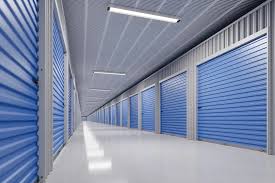What Is Climate-Controlled Storage?
Climate-controlled storage facilities have become essential for anyone looking to safeguard their belongings from the unpredictability of weather changes. These storage units are designed to maintain stable temperature and humidity levels, providing an environment similar to a living space, which is crucial for sensitive items. Whether you’re considering storing cherished antiques, essential business documents, or a delicate counter top fudge case, climate-controlled storage offers a reliable and protective solution.
The concept of climate-controlled storage is fundamental as it allows for storing personal and commercial goods without the risk of deterioration due to environmental factors. For many, these units represent the perfect compromise between affordable storage and the specialized care required to preserve high-value items. This type of storage stands as a testament to the rising demand for more sophisticated storage solutions in today’s rapidly changing climate.
Residential Storage Benefits
Homeowners often find themselves in need of additional space, but not all storage solutions are created equal. While standard storage units might fit the bill for less vulnerable items, climate-controlled units offer a distinct advantage for keeping items like wooden furniture, electronics, and family heirlooms safe. Exposure to fluctuating temperatures and humidity can lead to warping, rust, and overall deterioration—issues easily mitigated with controlled conditions. Moreover, with climate-controlled storage, individuals gain peace of mind knowing that their precious belongings will remain pristine, regardless of external climatic conditions.
Commercial Storage Benefits
From small businesses to large corporations, the need for climate-controlled storage is often driven by the type of goods they handle. Businesses operating within industries such as pharmaceuticals, technology, and food services heavily rely on these specialized units to ensure their products adhere to strict industry standards while remaining intact. Pharmaceuticals, for instance, require precise temperature control to maintain the efficacy of medications, making climate-controlled storage fundamental to compliance and safety. This type of storage has become indispensable in providing businesses with the confidence to store their products securely.
Protecting Valuable Items
Protecting valuable items involves more than simply packaging them into storage. Items like artwork, musical instruments, and vintage wines require a stable climate to preserve their integrity. The role of climate-controlled units cannot be underestimated as they offer a haven for organic materials susceptible to environmental damage, such as wood and canvas. Notably, artists and collectors increasingly seek out climate-controlled storage solutions to ensure that their investments are safeguarded. Artists employ climate-controlled studios as a proactive measure to protect their priceless masterpieces, ensuring their longevity amidst varying environmental conditions.
Comparative Costs
While the upfront costs of climate-controlled storage units may seem higher than those of traditional storage, the decision often pays off in the long run. Considering the potential cost of damage to stored items, this type of storage is a worthwhile investment for many. The valuation of possessions and the inherent risks involved without climate control underscores the benefits of opting for a more specialized storage solution. The choice becomes clear for individuals and businesses alike when weighed against the peace of mind and protection offered by these advanced facilities.
How to Choose the Right Storage
- Consider the value and sensitivity of your belongings as well as the length of storage required. High-value items left for extended periods benefit immensely from climate-controlled environments.
- Evaluate the local climate and consider typical weather patterns. Climate-controlled storage could be essential if your area is known for extreme temperatures or high humidity.
- Visit potential facilities in person to check their security features, maintenance standards, and environmental controls. A firsthand inspection can reveal much about how well a facility manages its climate-controlled units.
- Inquire about insurance coverage options available for stored items. This not only provides an added layer of security but also gives confidence in the facility’s ability to protect your goods.
Real-World Examples
Industries worldwide are leveraging climate-controlled storage solutions to maintain the quality and safety of their products. For instance, the wine industry, which is deeply affected by conditions during the fermentation and aging processes, finds these solutions indispensable. Vintners can ensure optimal aging by controlling environmental variables, which translates to better quality and value. Wine Enthusiast reports that climate-controlled storage is becoming a key strategy for producers as they confront the unprecedented challenges posed by climate change and strive to protect the flavor profiles of their products.
The Future of Storage Solutions
As technology progresses, the landscape of climate-controlled storage promises to grow even more sophisticated. Emerging innovations like AI-powered climate controls and smart sensors are setting new standards for efficiency and reliability. These technologies can adjust real-time settings based on external weather patterns or the specific needs of the stored items to guarantee the highest level of preservation. The continual evolution of storage solutions points toward a future where protecting valuable items becomes even more seamless and efficient. As these advancements become more accessible, residential and commercial users will find added value and assurance in their climate-controlled facilities.

 Education1 year ago
Education1 year ago
 Health1 year ago
Health1 year ago
 Business1 year ago
Business1 year ago
 Game1 year ago
Game1 year ago
 Tech1 year ago
Tech1 year ago
 Tech1 year ago
Tech1 year ago
 Travel1 year ago
Travel1 year ago
 Entertainment1 year ago
Entertainment1 year ago



















